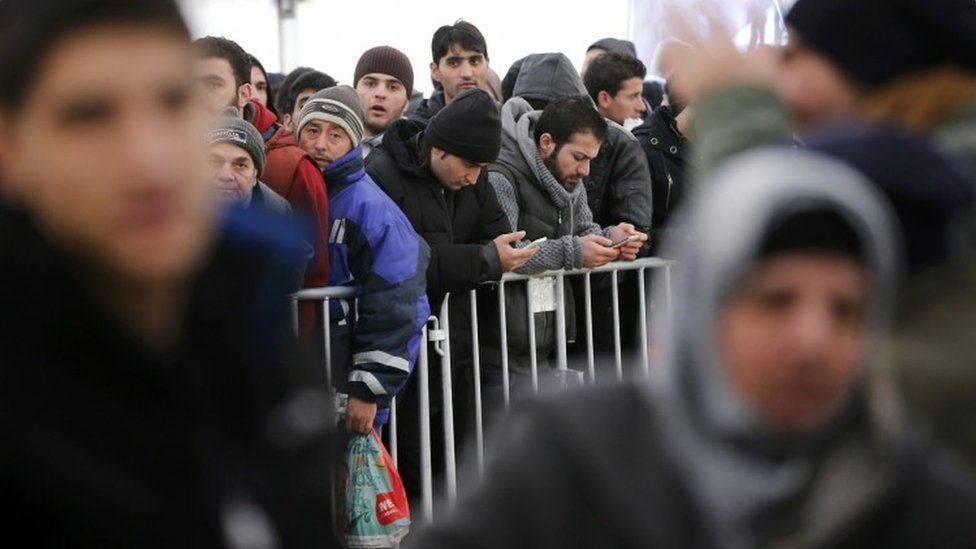Germany struggling to cope with migrant influx
- Published

"I understand that refugees need somewhere safe to go but Germany can't save the world by itself.
"Hopefully this nightmare will soon be over - for them and for us. Then they'll be able to go back to their own homes. And leave ours for good."
It is a journalistic cliché to quote your taxi driver but East German Alexander in his smart Mercedes summed up perfectly the pervading mood in his country.
So I can't ignore him.
He, like most Germans, according to a recent poll by the public broadcaster ZDF, thinks the country cannot cope with the huge amount of refugees and other migrants who have arrived over the last year.
Concern has spread particularly after the mass sexual assaults by migrants and others on New Year's Eve in the city of Cologne.
Since then, pepper spray, mace and non-lethal gas pistols have been flying off the shelves here.
"You can buy these items legally in Germany," Pavel Svedlov, manager of Berlin's Soldier of Fortune weapons shop told me, "though they are illegal to use against other people. But our clients are more concerned about protecting themselves. That is their priority.
"People are coming to Germany with fake IDs or no papers at all, saying they are refugees. We have no idea who they really are. Many Germans feel it's a ticking time bomb.
"The people who came to our shop used to be young men but now we have a lot of female customers and older people too. We normally offer a choice of 15 different types of pepper sprays for example. Now we've sold out and so have our suppliers."
'Not racist'
Construction worker Matthias told us he'd come to the shop out of concern for his wife.
"I'm not racist," he said, "but ever since the Cologne attacks, I think it's wise for women to carry something with them for self-defence but every shop I've been to has sold out of pepper spray."
Retiree Juergen said he was looking for a gas pistol (it fires a substance similar to tear gas) to keep him safe at home. He said the situation in Germany was getting "worse and worse" and the police were overwhelmed and underfunded.
All this is hugely significant in Germany.
Because of the country's Nazi past, people here tend to be very sensitive about attitudes towards minorities and about the use of weapons - even by their military.
They trusted their government - and Angela Merkel in particular- to provide the stability and security Germans hold so dear. But most Germans now say her migration policy was a mistake.
After flinging open the door a few months ago, Chancellor Merkel is now under public and political pressure, including from within her own conservative CDU/CSU political group, to set an upper limit - as Austria has just done - on the number of newcomers the country will allow in.
After which the government could shout: No more. We're full!
So, will Angela Merkel make such an announcement?
'Huge task'
I couldn't get a straight reply when I asked the state secretary for Germany's Interior Ministry, Emily Haber, but she did say that a single unilateral measure like that wouldn't be enough to stop complex migratory pressures.
She said reducing the number of arrivals was her government's priority: more than one million newcomers came to Germany last year and the country couldn't take one million more in 2016.
But Dr Haber emphasised that, to be effective, all EU partners needed to work together to stop the flow of people to Europe.
In the meantime, the Merkel government has been accused of failing its people by opening the country to "outsiders" without considering the impact fully.
Dr Haber admitted that integrating the newcomers was "probably one of the hugest tasks my country has faced ever since 1949".
"Many of them don't share the bulk of what any mainstream society would agree on. They come from different backgrounds, they have different views on how to respect women or not. They have different views on how to resolve conflicts, they have different views on how to respect, that we must respect other religions.
"They have different views on what is the historical responsibility of Germany and so forth and that will all have to be factored in and that's a huge challenge."
State-funded language classes are being offered as a first step towards integration but here lies another challenge - the concern among Germany's migrant communities, both recently arrived and well-established, that the criminal behaviour of some in Cologne and elsewhere will now affect them all.
Turkish-German social worker Ercan Yasaroglu, who has lived in Berlin for three decades, is gloomy.
"In one night in Cologne, Germany's welcome culture was destroyed. There's now a new kind of racism here, affecting all of us with a migrant background.
"The danger is, there could then be a backlash amongst some migrants who feel ostracised and angry. Violence breeds violence. But I'm optimistic Angela Merkel can work this out."
We can do this, Mrs Merkel said a few months ago.
But would she repeat that now? The migrant question has thrown the EU into crisis, and even this, its most powerful nation, is struggling to find a way out.